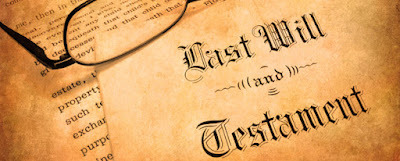8 Pentecost

August 3, 2025
Luke 12:13-21
+ A few weeks ago in my sermon, I mentioned that I revised my willabout a month ago.
It was a good thing to do.
It has been almost 13 years since I revised it.
And a lot has happened in 13 years in my life!
But doing so, reminded me of one of my duties as your priest.
I’d like you to take a look at a section of the Prayer Book thatI’ve showed you before, but I’d like to draw your attention to once again.
On page 445, you will find something very interesting.
It says this,
The Minister of the Congregation [that’s me] is directed toinstruct the people [that’s you], from time to time, about the duty ofChristian parents to make prudent provision for the well-being of theirfamilies, and of all persons to make wills, while they are in health, arrangingfor the disposal of their temporal goods, not neglecting, if they are able, toleave bequests for religious and charitable uses.
I always encourage people—no matter where they are financially intheir lives—to make out a Will.
And now that we have an endowment here at St. Stephen’s, I alsoencourage people to remember St. Stephen’s in their wills.
Wills are more than just a means of giving away our earthlypossessions when we die.
They truly can be a practical expression of one’s faith and apositive acknowledgement of our own mortality and dependence upon God.
For me in having a will, there was a sense of accomplishment inknowing that what I have will be distributed to those people and thoseorganizations that I know would appreciate them and benefit from them.
And it was also a relief to be able to put in that Will suchpractical instructions as my funeral arrangements (which, as you me say timeand again, I highly encourage everyone to consider and write down in some wayor form).
But the real reason we make out a will is because of this onesimple fact: we cannot, whether we like it or not, take what have with us whenwe shed this mortal coil.
I hate to break that news to you.
None of the money we have made and saved and invested will go withus when we pass from this life.
Our cars, our houses, our books, our art, our stocks and bonds,our fabulous 1950s furniture will not go with us as we pass through the veil.
OK, maybe that part about the fabulous 1950s furniture onlyapplies to me and Steve Bolduc.
But you see where I am going with this.
Which the whole reason we make Wills.
We make Wills to give us a sense of security about what we haveand where it will go when it is no longer ours.
We like to know where these things we worked so hard to get willgo.
Still, having said all that, I have never been comfortable talkingabout Wills and money.
It’s such a personal thing.
Which, I know, is completely pointless.
In this morning’s Gospel we find this “someone” in the crowd who isfretting over his possessions, it seems.
And this “someone” just hasn’t quite understood what Jesus issaying when he says “do not be afraid,” which is what he was telling them rightbefore this particular incident.
But as easy as it is to judge this poor person quarreling with hisbrother—as much as we want to say—“look at that fool, bringing his financialconcerns before Jesus,” the fact is, more often than we probably care to admit,this is the person we no doubt find ourselves relating to.
In this society that we live in, in this country in which we livein, we naturally think a lot about money and finances.
We spend a lot of time storing our money, investing our money,making more money and depending on money.
None of which, in and ofits self, is bad.
People often think the old saying says, “money is the root ofevil.
But what the aphorism really says is, “LOVE of money is the rootof all evil.”
And that is bad.
For those who don’t have much, they worry about how to survive,how to live, how to make more.
For those with money, they worry about keeping the money theyhave, making sure their money isn’t stolen or misused.
And we don’t just worry about the money in our lives.
We worry about all our material “treasures.”
We worry about protecting our possessions from robbers, or fire ornatural disaster.
We insure them and store them and we spend time planning how topass our treasures on after we die.
We are concerned about what we have and we might even findourselves looking for and seeking those things we don’t have.
And there is nothing inherently wrong with any of this either.
It’s good stewardship to take care of that with which God hasblessed us and take care of those things.
What Jesus is talking about in today’s Gospel is not so much theseissues—it’s not money per se, or the “things” in our lives.
What Jesus is talking is something worse.
He is talking about greed, or as older translations used,covetousness.
Greed and covetousness are not the same thing.
They are actually two different things.
Greed involves us—it involves us wanting more than we need.
Covetousness is wanting what others have.
Covetousness involves envy and jealousy. (And envy and jealousyare two different things as well, but we won’t get into that today)
Covetousness involves looking at others and wanting what they havedesperately.
And at times, we’ve all been guilty of both of these things.
I’m certainly guilty of covetousness.
I want to covet Steve Bolduc’s very cool 1950s aqua blue clouchthat he found in his basement.
In our society, we are primed to be a bit greedy and we are primedto covet.
Look at some of the ads we see on TV.
We are shown products in such a way that we actually come todesire them.
And they are shown in the context of some other person enjoyingthem so much that we should want them too.
And, in this society, we are primed to want more than we need.
We’re all guilty of it.
And we should be aware of this fact in our lives.
And in being aware of this, we need to keep Jesus’ words close toheart.
Because Jesus is clear here.
There are two kinds of treasures.
There are those treasures we have here on earth—the ones weactually own, the ones we might need and the ones others have that we want(like 1950s aqua blue couches)— and the ones we store up for ourselves inheaven.
And, let’s be honest, those treasures we are expected to store upfor ourselves in heaven are not the easiest ones to gain for ourselves.
They are not the ones we probably think about too often in ourlives.
Jesus isn’t too clear in today’s Gospel exactly what thosetreasures are, but it won’t take much guessing on our part to figure them out.
The treasures we store up for ourselves in the next world arethose that come out of loving God and loving each other.
But we have to be careful when considering what it is we arestoring up for ourselves.
It is not the idea that good deeds will get us into heaven.
We need to be very clear here.
Jesus is not at any point saying to us that what we do here on earth is going to guaranteeus a place in heaven.
But what he is saying is that we don’t get to take any of ourpossessions with us when we leave this world.
All of it will be left behind.
Every last thing we have right now in our lives—every previous thing—will be left behind when we die.
However, Jesus says, if you do these good things in your life, youwill be closer to heaven.
You will not “win” heaven by doing them.
But…by doing good things for one another, you will be bringingheaven closer into our lives.
I can’t stress enough how important it is to take care of thetreasures we have on earth.
We should always be thankful for them.
And we should be willing to share them as are needed.
And to take care of these those things that are meaningful to us—likeSt. Stephen’s.
Our job as Christians is to take care of our possessions here onearth—with whatever God granted to us in our lives.
Considering what we heard from our Book of Common Prayer earlierwe know that we are encouraged to look after our earthly treasures and to sharethem in a spirit of goodness and forbearance.
By arranging for our Wills to be made, by being generous with ourgifts and with the instructions we give our loved ones who survive us, we aretruly responding to today’s Gospel.
By being generous with our gifts , and by being generous to thosewho share this earth with us, we are building up treasures in heaven.
We are not “buying” our way into heaven.
We are just striving to do good on this earth, as faithfulfollowers of Jesus and as beloved children of a loving God.
And striving to do good does build up those treasures in heaven.
In all of this, let us listen in a way the anonymous person intoday’s Gospel did not.
Let us listen to Jesus’ words of “do not be afraid.”
Do not be afraid.
Do not be afraid of what will happen to the possessions you haveon earth.
Do not let fear reign in your life by letting greed andcovetousness rule your lives.
Do not get all caught up in the things you have, or the thingsyour neighbors have.
Or those things you don’t have but really want.
Instead, let us love our neighbor as we would love ourselves.
And let us love our God who provides for us everything we canpossibly need.
And let us know that that same God whom we love and who loves usin return has a special place prepared for us which is full of riches beyondour comprehension.
For, as Jesus makes clear in pointing out, our lives do “notconsist in the abundance of our possessions.”
We are more than our possessions.
We are more than what we have.
In that place to which are going, we will go naked and empty-handed.
We will go shed of all attachments and possessions.
We will go there shed even of our very bodies.
But we will go there, unafraid.
And we will go there gloriously and radiantly clothed with hopeand joy and love.



